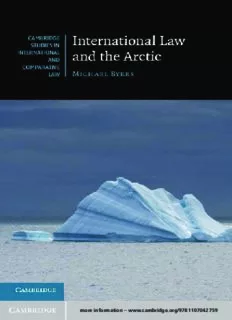Table Of Contentmore information – www.cambridge.org/9781107042759
InternationalLawandtheArctic
ClimatechangeandrisingoilpriceshavethrusttheArctictothe
topoftheforeignpolicyagendaandraiseddifficultissuesof
sovereignty,security,andenvironmentalprotection.Improved
accessforshippingandresourcedevelopmentareleadingtonew
internationalrulesonsafety,pollutionprevention,and
emergencyresponse.AroundtheArctic,maritimeboundary
disputesarebeingnegotiatedandresolved,andnew
internationalinstitutions,suchastheArcticCouncil,are
mediatingdeep-rootedtensionsbetweenRussiaandNATOand
betweennationstatesandindigenouspeoples.InternationalLaw
andtheArcticexplainsthesedevelopmentsandrevealsastrong
trendtowardinternationalcooperationandlaw-making.Itthus
contradictsthewidespreadmisconceptionthattheArcticisan
unregulatedzoneofpotentialconflict.
MichaelByersholdstheCanadaResearchChairinGlobal
PoliticsandInternationalLawattheUniversityofBritish
Columbia.
cambridge studies in international and comparative law
Establishedin1946,thisseriesproduceshigh-qualityscholarshipinthefieldsof
publicandprivateinternationallawandcomparativelaw.Althoughtheseare
distinctlegalsub-disciplines,developmentssince1946confirmtheir
interrelations.
Comparativelawisincreasinglyusedasatoolinthemakingoflawat
national,regional,andinternationallevels.Privateinternationallawisnow
oftenaffectedbyinternationalconventions,andtheissuesfacedbyclassical
conflictsrulesarefrequentlydealtwithbysubstantiveharmonizationoflaw
underinternationalauspices.Mixedinternationalarbitrations,especiallythose
involvingstateeconomicactivity,raisemixedquestionsofpublicandprivate
internationallaw,whileinmanyfields(suchastheprotectionofhumanrights
anddemocraticstandards,investmentguaranteesandinternationalcriminal
law)internationalandnationalsystemsinteract.Nationalconstitutional
arrangementsrelatingto“foreignaffairs,”andtotheimplementationof
internationalnorms,areafocusofattention.
TheSerieswelcomesworksofatheoreticalorinterdisciplinarycharacter,and
thosefocusingonthenewapproachestointernationalorcomparativelawor
conflictsoflaw.Studiesofparticularinstitutionsorproblemsareequally
welcome,asaretranslationsofthebestworkpublishedinotherlanguages.
GeneralEditors JamesCrawfordSCFBAWhewellProfessorofInternationalLaw,
FacultyofLaw,UniversityofCambridge
JohnS.BellFBAProfessorofLaw,FacultyofLaw,Universityof
Cambridge
Alistofbooksintheseriescanbefoundattheendofthisvolume.
International Law and the Arctic
Michael Byers
WithJamesBaker
UniversityPrintingHouse,CambridgeCB28BS,UnitedKingdom
PublishedintheUnitedStatesofAmericabyCambridgeUniversityPress,NewYork
CambridgeUniversityPressispartoftheUniversityofCambridge.
ItfurtherstheUniversity’smissionbydisseminatingknowledgeinthepursuitof
education,learning,andresearchatthehighestinternationallevelsofexcellence.
www.cambridge.org
Informationonthistitle:www.cambridge.org/9781107042759
(cid:1)MichaelByers2013
Thispublicationisincopyright.Subjecttostatutoryexception
andtotheprovisionsofrelevantcollectivelicensingagreements,
noreproductionofanypartmaytakeplacewithoutthewritten
permissionofCambridgeUniversityPress.
Firstpublished2013
PrintedintheUnitedKingdombyCPIGroupLtd,CroydonCR04YY
AcataloguerecordforthispublicationisavailablefromtheBritishLibrary
LibraryofCongressCataloguinginPublicationdata
Byers,Michael,1966–
Internationallawandthearctic/MichaelByers.
pages cm.– (Cambridgestudiesininternationalandcomparativelaw;103)
Includesbibliographicalreferencesandindex.
ISBN978-1-107-04275-9(hardback)
1. Arcticregions–Internationalstatus. 2. Arcticregions–International
cooperation. I. Title.
KZ4110.P65B94 2013
341.405091632–dc23
2013023187
ISBN978-1-107-04275-9Hardback
CambridgeUniversityPresshasnoresponsibilityforthepersistenceoraccuracyof
URLsforexternalorthird-partyinternetwebsitesreferredtointhispublication,
anddoesnotguaranteethatanycontentonsuchwebsitesis,orwillremain,
accurateorappropriate.
ItisoftensaidtherearefewtrulyuntamedplacesleftonEarth,butthewindswepthorizons
oftheArcticsurelyqualify.Somepoliticalanalystsmaintainthatthegeopoliticallandscape
isequallyharsh–alawlessregionpoisedforconflictduetoanaccelerating“raceforthe
NorthPole.”
Wedisagree.Instead,wefirmlybelievethattheArcticcanbeusedtodemonstratejust
howmuchpeaceandcollectiveinterestscanbeservedthroughtheimplementationofthe
international rule of law. Moreover, we believe that the challenges in the Arctic should
inspire momentum in international relations, based on co-operation rather than rivalry
andconfrontation,andwebelievethatimportantstepshavealreadybeentakentoward
thisgoal.
RussianForeignMinisterSergeiLavrovandNorwegianForeignMinister
JonasGahrStøre,“Canada,TakeNote:Here’sHowtoResolve
MaritimeDisputes,”GlobeandMail,September21,2010
Description:Climate change and rising oil prices have thrust the Arctic to the top of the foreign policy agenda and raised difficult issues of sovereignty, security and environmental protection. Improved access for shipping and resource development is leading to new international rules on safety, pollution prev

